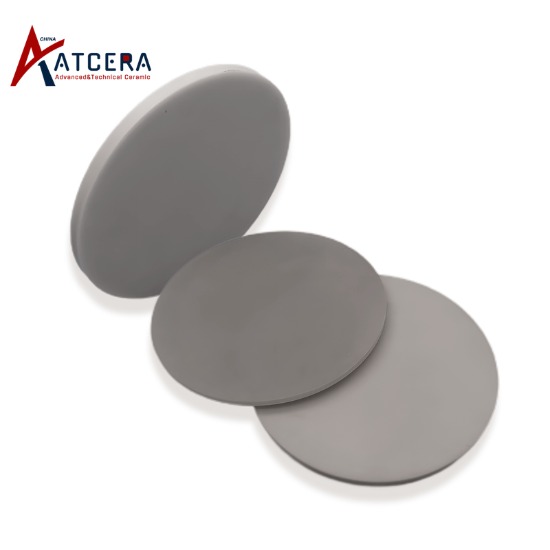How to Improve the Thermal Conductivity of AlN Substrate
Scientists have found that microstructure and oxygen impurity content are the two most important factors affecting the thermal conductivity of AlN ceramics. Therefore, in order to improve the thermal conductivity of AlN ceramics, more attention must be paid to the preparation of ceramic powder raw materials and sintering process - and continuous experimental research shows that refining the original aluminum nitride powder and adding appropriate low temperature sintering additives are effective solutions.

The Selection of Powder Raw Materials
Aluminum nitride powder is the prerequisite and key to preparing aluminum nitride ceramic materials with excellent properties. The driving force of aluminum nitride sintering process is surface energy, and fine particles of AlN powder can enhance the sintering activity, increase the sintering force and accelerate the sintering process. It is confirmed that when the initial particle size of the original aluminum nitride powder is 20 times smaller, the sintering rate of the ceramic will increase by 147 times.
At the same time, in order to prevent secondary recrystallization, the particle size of the original powder should also be fine and uniform, if there are a small number of large particles in the particle, it is easy to occur abnormal grain growth and is not conducive to densification and sintering; If the particle distribution is not uniform, the abnormal growth of individual crystals is easy to occur during the sintering process and affect the sintering.
In addition, the sintering mechanism of aluminum nitride ceramics is sometimes affected by the size of the original powder. The micrometer aluminum nitride powder is sintered according to the volume diffusion mechanism, while the nano-scale powder is sintered according to the grain boundary diffusion or surface diffusion mechanism.
Kuramot et al. showed that under the premise of not adding any low-temperature sintering additives, when the specific surface area of aluminum nitride powder was about 3m 2 /g, aluminum nitride could not reach dense firing even at a high temperature of 1900℃, while the particle size was 80-100nm, the specific surface area was 40~50m 2 /g and the particle size was about 0.11μm. The aluminum nitride powder with a specific surface area of 16.6 m2 /g can basically reach the theoretical density when sintered at 1700℃.
Hashimoto, Panchula and Ying confirmed that adding an appropriate amount of nanometer aluminum nitride powder to the original aluminum nitride powder can achieve compact sintering of aluminum nitride ceramics at 1700℃ under normal pressure. Watari et al. 's research also shows that the sintering performance of AL nitride ceramics is directly proportional to the fineness of the original powder, that is, the finer the original powder, the better the sintering performance.
Although the selection of fine and uniform particle size powder can reduce the sintering temperature of aluminum nitride ceramics to a certain extent, but fine and uniform aluminum nitride powder system is difficult to prepare, mostly through wet chemical method combined with carbothermal reduction method, not only the sintering process is complex, and energy consumption is large, is not suitable for large-scale promotion and application. The addition of suitable sintering additives can significantly reduce the sintering temperature of AlN ceramics and improve some properties of AlN ceramics. At present, this method has been widely applied and studied.
The Selection of Sintering Additives
At present, the most popular method for sintering aluminum nitride substrate is to add suitable sintering additives and sintering under normal pressure. This method can not only greatly reduce energy consumption, but also prepare high-performance AlN ceramics. The results show that the liquid phase can be produced in the sintering process of Al nitride by adding some sintering additives with low melting point, and the dense sintering of Al nitride embryo can be promoted.
In addition, some sintering additives can not only produce liquid phase to promote sintering, but also react with oxygen impurities in the aluminum nitride lattice to remove oxygen impurities and purify the lattice, thereby improving the thermal conductivity of AlN ceramics. However, sintering additives can not be blindly added, the amount added should also be appropriate, otherwise it may have an adverse effect. For example, excessive addition of sintering additives will lead to the emergence of a large number of second phases, which will significantly reduce the thermal conductivity of AlN.
Hirano et al. obtained densified AlN ceramics with thermal conductivity of only 114W/m·K by holding AlN powder without adding sintering additives at 1900℃ for 8h, while the thermal conductivity increased to 218W/m·K by adding 4% Y2O3 under the same conditions. Liu et al. studied the sintering of AlN ceramics under N2 atmosphere at 1650℃ without pressure with Dy 23 as the sintering agent, and obtained AlN ceramics with a thermal conductivity of 156W/m·k. The results showed that Dy 23 can effectively remove oxygen impurities in aluminum nitride and improve the thermal conductivity of ALN ceramics. Watari et al. added LiYO 2-CaO and sintered at 1600℃ to obtain AlN ceramics with thermal conductivity greater than 170W/m·K. Zhou Heping and Qiao Liang achieved the compact sintering of aluminum nitride ceramics at a low sintering temperature of 1650℃ by adding a composite sintering agent CaF 2-y 2 O 3-Li 2 CO 3 to aluminum nitride, and the thermal conductivity was as high as 177W/m·K.
评论
发表评论